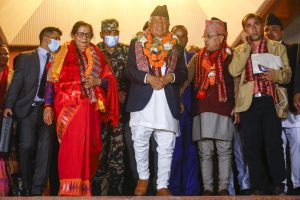On May 28, Nepali President Ramchandra Poudel pardoned the remaining jail terms of 501 inmates in Nepali jails. Among them was former law-maker Resham Chaudhary, who was convicted as the “mastermind” of the 2015 Tikapur carnage.
The massacre happened amid the Tharuhat movement, a political movement for the rights of the indigenous Tharu community. During a clash between police and protestors at Tikapur in Kailali district in August of that year, eight police personnel and a toddler were killed.
Chaudhary was convicted for his role in the mass killing and slapped with a life sentence by all three levels of the judicial hierarchy — the District Court, the High Court, and the Supreme Court of Nepal.
Ten days after the Supreme Court verdict in the case against Chaudhary (the full text of the decision is yet to be made public), Poudel, who as president of Nepal is the custodian of the constitution, granted Chaudhary amnesty under Article 276.
Article 276 confers on the president the power to “grant pardons, suspend, commute or remit any sentence passed by any court, judicial, or quasi-judicial institution or administrative authority or institution.”
Poudel’s decision to pardon a person convicted in a mass murder has sparked heated debate in Nepal over the violation of the rule of law, and the influence of politics in the legal system. It has evoked strong criticism from across society as the pardon is seen to be driven by political interest.
It is noteworthy that Chaudhary is the brain behind the formation of the Nagarik Unmukti Party (NUP), a constituent of Nepal’s ruling coalition. The party won four seats in the 2022 general elections and is the ninth-largest party in the House of Representatives. Also, the NUP extended support to Poudel’s election as president.
The possibility of the NUP supporting Poudel’s election as president in exchange for the amnesty of its leader cannot be ruled out. Clemency for Chaudhary was the NUP’s sole demand during talks on government formation.
Section 159 of the Criminal Procedure Code (CrPC) 2017 states that no action may be taken to pardon, suspend, alter, or reduce the sentence imposed on a convict in cases relating to corruption, torture, rape, or murder in a cruel and inhumane way or by taking hostage, genocide, explosives, kidnapping, hostage-taking or enforced disappearance, human trafficking and transportation, money laundering, and narcotic drugs trafficking or transaction punishable by a sentence of imprisonment for a term exceeding three years.
Chaudhary’s conviction came in a serious murder and therefore, the presidential pardon violates Section 159 of the CrPC.
Undoubtedly, the presidential pardon is a short-sighted political gesture, which will bolster the criminalization of politics as well as the politicization of crime.
It could boost the idea that a criminal can find full immunity against legal redress under the canopy of a political organization. Consequently, criminals will be motivated to establish proximity with power centers, so that their illegitimate deeds can be swept under the rug. If the government keeps granting amnesty based on the political clout of the convict, impunity will surge in the country.
Moreover, the practice of pardoning without providing a transparent rationale could erode public trust in the justice system.
Another major concern emanating from granting clemency to assassins of state actors (police) is its impact on the morale and professional dignity of the Nepal Police Force. Nepal Police is the national law enforcement organization of the country, which is responsible for upholding law and order, preventing crime, and carrying out criminal investigations within the boundaries set by the Nepali Constitution.
Amidst reports of the amnesty granted to Chaudhary, the wife of a policeman murdered in Tikapur filed a petition in the office of the president pleading refusal of amnesty. But the office turned a blind eye to her request.
Chaudhary is walking scot-free. It will not be a surprise if he gets into electoral politics or gets appointed to a constitutional body in the near future.
The police force escorting Chaudhary in his public engagements will develop an anticipated regression of their professional indemnity. An organization with low morale can never be expected to be fully competent. It is therefore necessary to interrogate the propriety of granting amnesty to Chaudhary.

































